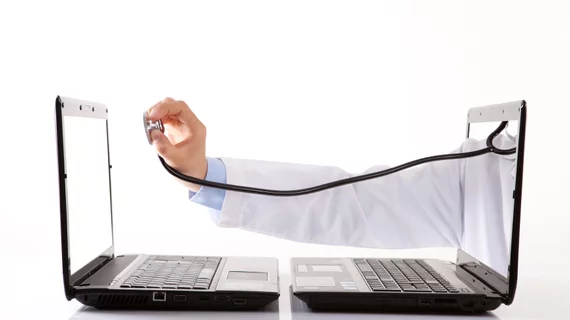Virtual visits may improve patient convenience without compromising quality of care, communication
Virtual video visits can replace office visits for patients without compromising healthcare quality and communication, researchers from Massachusetts General Hospital (MGH) in Boston reported in a new study published online in the American Journal of Managed Care.
A nationally representative survey published in the December issue of Health Affairs by the American Medical Association found that radiologists utilized telemedicine more than any other health care specialty. The survey also reported that videoconferencing was the most widely used telemedicine modality. If used appropriately, as the study suggests, virtual video visits by radiologists and other clinicians could improve patient-centered care.
“Telehealth gives them [patients] more of what they want most and gets rid of the stuff they don’t want,” Lee Schwamm, MD, senior author of the study and director of the MGH Center for TeleHealth, said in a prepared statement. “With a telehealth visit, 95 percent of the time spent by the patient is face-to-face with the doctor, compared to less than 20 percent of a traditional visit, in which most time is spent traveling and waiting.”
For the study, Schwamm and colleagues sent surveys to 426 patients and 74 attending physicians in the MGH’s departments of psychiatry, neurology, cardiology, primary care and oncology who participated in the first full year of the MGH TeleHealth Program. The program was launched in 2012 with virtual visits between patients, community providers and Mass. General physicians offered in the beginning 2013.
Survey responses were collected from 254 patients after their first virtual visits and from 61 attending physicians.
Key findings of the study included the following:
- 79 percent of patients felt that finding a convenient time for a follow-up virtual video visit was easier than for a traditional office visit.
- 62 percent of patients reported the quality of virtual video visits was no different from that of office visits; 21 percent of patients thought virtual visits’ overall quality was better.
- 59 percent of physicians agreed that, for the patients selected for these visits, virtual visit quality was similar to that experienced at office visits; one-third thought office visit quality was better.
- 46 percent of physicians said they thought office visits were better, compared to 33 percent of patients.
- 68 percent of patients rated virtual video visits at 9 or 10 on a 10-point scale.
- Patients who rated the visits lower were generally concerned about technical issues they experienced during their first use of the system.
- Physicians reported that virtual video visits are superior to office visits for timely scheduling of patient appointments (70.5 percent) and for visit efficiency (52.5 percent) but cautioned that these visits are not appropriate in all patient situations.
The researchers noted that while 89 percent of patients who had virtual video visits said their clinical issues could have been addressed in a traditional office setting, 60 percent, 31 percent and 20 percent indicated telephone calls, secure email and text messaging, respectively, could work just as well.
“Some of the participants in our study were parents of children who needed multiple frequent visits or older patients for whom travel was difficult to arrange,” Karen Donelan, lead author of the study and senior scientist at the MGH-based Mongan Institute Health Policy Center, said in the prepared statement.
“It did not surprise us that they found virtual visits more convenient, but we were impressed that nearly all perceived the quality of care or communication to be the same or better than at the traditional and familiar office visits.”
Patients also reported that the virtual visits added considerable convenience, saved travel time and expressed willingness to pay copayments for virtual visits. Most patients and clinicians also saw no loss of communication with virtual visits, however some clinicians could see a future loss in personal connection with their patients.
Nonetheless, the researchers concluded that virtual visits could be a useful option for clinical care.
“These visits are not just replacements for in-office visits; they hold the possibility of new avenues for care delivery, more frequent but shorter encounters, and opportunity for earlier intervention,” Donelan et al. wrote.

